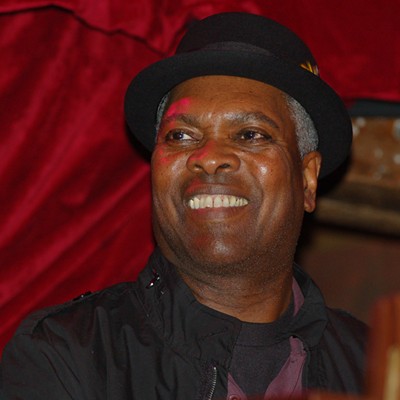It's not hyperbole to say that Hunter has had a hand in redefining the state of jazz. During the last 18 years, he has recorded nearly 20 albums with nearly as many lineups; played in various side projects such as Garage a Trois, T.J. Kirk and Groundtruther; and backed up countless other musicians.
He also tours near-constantly. Hunter will return to Tucson with his latest group to play a concert Sunday night, March 8, at the Rialto Theatre.
But a discussion of the state of jazz in the 21st century caused him to wonder, "Is there any such thing as jazz? I don't really think so."
During a recent phone conversation from his home in New Jersey, the genial Hunter posed as many questions as he answered.
"What is jazz? I mean, some would say jazz ended with Louis Armstrong when he switched from cornet to trumpet. How do we define jazz now, in 2009? It's so wide open that anything fits the description, or nothing does. You don't go up to some person who is painting, and ask what they think the state of cubism is today. Cubism, and those guys like Picasso and Braque, might be a part of what that painter is coming to terms with, but it's not what's going on in art now."
Hunter's brand of jazz, if we can call it that, is all-inclusive. Over the course of his career, he has playfully and hungrily incorporated into his sound funk, R&B, reggae, hip-hop, blues, rock and more. Whatever he has played, it has always been about the groove.
Hunter feels music should be liberating, not captive to genre, public opinion or exploitative business concerns--meaning the increasingly unsteady economic health of the music industry has not been without its benefits.
"The liberation that comes with the impending end of the music business as we have known it has allowed for the creation of new resources and avenues and paths where the music can go in the restoration process," he said.
Hunter has taken the DIY spirit to heart. He released his latest album, Baboon Strength, on his own, rather than through a record label. And he sells it himself--either as a download version or, if you prefer, a CD through his Web site and at gigs. It can be had digitally at www.reapandsow.com , as well as other major digital-music retailers.
"I just do it myself now. I sell so few records, there's no need to have a record company; there's no need to have a record company's resources or obligations. This is the first record I've made this way, and the idea is to see how it sells, and hopefully, it'll sell enough copies to pay for the next one."
Hunter says recording albums for a record company always felt a little weird to him.
"It's kind of odd for people like me--who make our living playing live, playing thousands and thousands of gigs in our lives--to turn around and do it for someone else to benefit from.
"I was a street musician, and what we do now is sort of like being a street musician. It's like you're totally stripped of the vagaries or machinery of the modern marketing and distribution systems. It's like the street corner. You just go out, get to the venue and play."
Born 41 years ago in Rhode Island, Hunter was raised from an early age in the San Francisco Bay Area. As a teenager, he took guitar lessons from well-known guitarist Joe Satriani. In the early 1990s, he played with the political and industrial hip-hop act Disposable Heroes of Hiphoprisy, which included vocalist Michael Franti.
By that time, Hunter was playing a unique seven-string electric guitar of his own design. It featured three bass strings and four guitar strings, allowing him to play bass lines and guitar parts simultaneously.
That evolved into an eight-string ax that Hunter played for many years, although since 2006, he has been back to a seven-string version. Hunter has noted in other interviews that his smallish hands caused him to change his left hand's position to take full advantage of the eighth string.
Anyone who has seen or heard Hunter over the years--no matter how many strings his guitar has--can testify not only to his dexterity, flow and improvisatory creativity, but to the undeniable groove of his music.
Although the amazing Baboon Strength leans heavily on the thick, soulful organ tones of keyboard player Erik Deutsch, Hunter already is heading in new directions. He said the current tour features a brand-new lineup, with which he'll be trying out a lot of new material.
When Hunter plays the Rialto, he'll share the bandstand with drummer Erik Kalb, trumpeter Eric Biondo and baritone sax player Cocheme'a Gastelum, the latter also a member of the funky Budos Band.
Hunter confirmed that his musical restlessness, stylistically and in terms of those with whom he plays, is part of his nature. It keeps him engaged in music and the world around him.
"I'm not a big star; I just do what I do. Most of the people who come to me, or who I seek out, it's just because we're searching for the right vibe. Whatever direction it takes us in is the best one. If I were to play stuff just because I thought it would sell, or just because I thought that's what people wanted to hear, I am sure it would never be as interesting."










